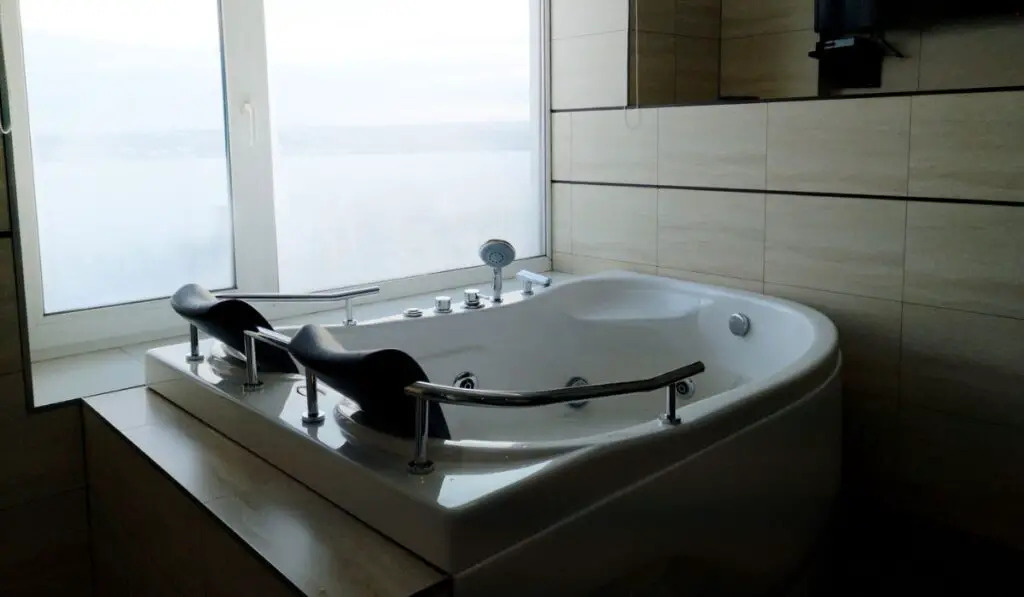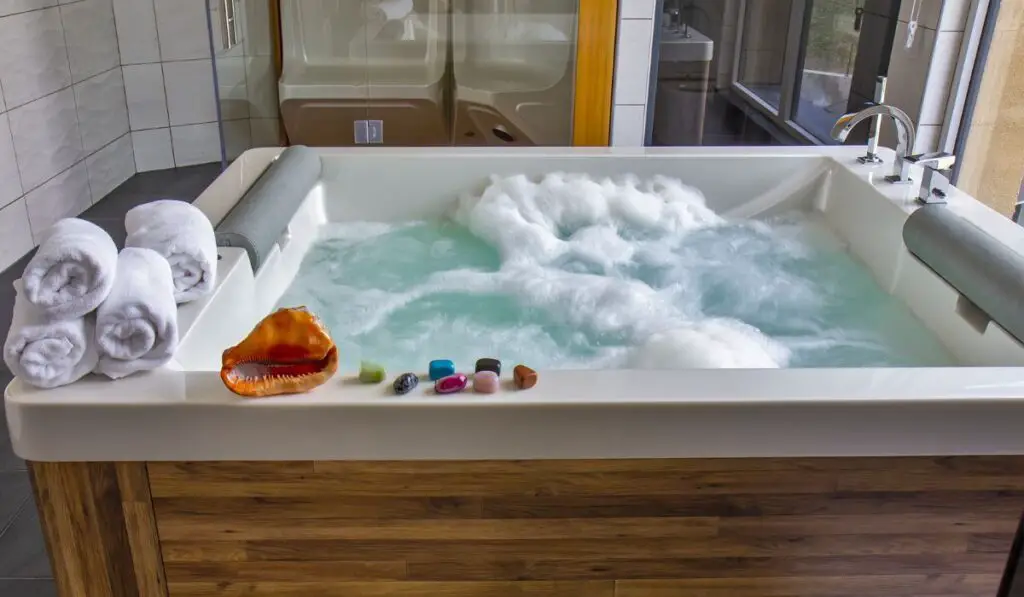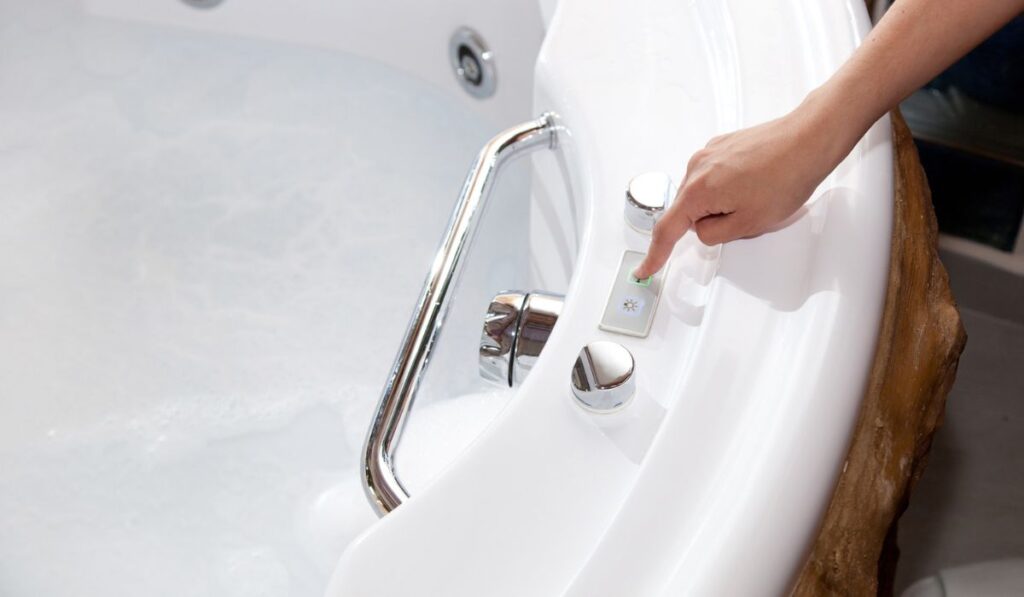A hot tub is meant to be a luxurious place to relax and unwind, so the noise produced by some hot tubs can be a real drag. Luckily, figuring out why your hot tub is so loud and fixing the issue could be the difference between enjoying yours for many years to come or having to get rid of it due to the annoying sounds it produces.
Hot tub noise can be caused by decking, the insulation, the pump, the number of jets or the programming of the filtration cycle. To minimize the noise, build a box around the motor or screen-in the hot tub. The quietest hot tub available is the SilentFlo 5000 from Hot Spring Spas.
Some noise from a hot tub is, of course, unavoidable. After all, you’re constantly heating a large volume of water and there’s a pump and filtration system that need to run at regular times. So, even while the hot tub isn’t in use, it’ll cause some noise. However, if the noise has become excessive, there are a few things you can try to quiet things down.
How Much Noise Do Hot Tubs Make?

Generally speaking, a hot tub typically emits between 41 and 67 decibels, even when it’s not in use. Comparatively speaking, this is a similar level to light rain or a normal conversation.
However, the sound produced by a hot tub depends on several different factors. For instance, the more jets you have in the hot tub, the louder it will be.
While the hot tub is on, you can usually hear it about 30 to 40 meters away. The more sound barriers you have, such as fences and foliage, the better insulated the sound will be — and your neighbors might be spared.
It’s no surprise that hot tubs are one of the number one complaints of noise in neighborhoods. Normally, if you’re sitting nearby or in the hot tub, it sounds like that of an idling car that’s slightly revving its engine.
When the hot tub is covered, it can sound like an air conditioning unit, a light hum that most people tend not to notice after awhile. This constant sound, even when not in use, comes from the heater needing to maintain a constant temperature of the water.
The secondary noise that a hot tub can make, even when it’s not in use, is the filtration system. Some hot tubs have a filtration mode that makes the jets come on at half speed and move the dirt and debris into the filters to maintain a clean hot tub.
This programming is often turned on at night and could cause more noise than is usually tolerated, especially in warmer weather when people are sleeping with windows open.
What Makes a Hot Tub Especially Loud?
If your hot tub is louder than average or you’ve noticed that it’s increased in volume, even when it’s not in use, then there’s most likely something else going on. This isn’t always the case, as different aspects of a hot tub carry different sounds, and some of it just has to do with your settings and how the hot tub functions.
Noise From the Pump
The mechanical sound that a hot tub produces almost always comes from the pump. The pump is a component that is required for every hot tub since it helps keep the water circulating.
The pump also powers the jets, so when the jets are on, the noise level will increase depending on how many jets you have.
Noise From the Hot Tub Vibrations and Reverberations
A hot tub’s location can amplify the natural vibrations and reverberations that it produces. For example, if your hot tub is on a wooden deck, the wood will amplify the noise to a certain extent.
You can always try to reduce these vibrations by putting a special pad (on Amazon) under the hot tub in order to muffle the sounds.
Poor Sound Insulation
Hot tubs generally have spray foam or other types of insulation around the jets and pipes that help muffle the noise they produce. Sometimes, manufacturers go even further and include insulation along the side panels and underneath the hot tub.
However, these kinds of heavily insulated hot tubs tend to be more expensive, while cheaper hot tubs tend to create more noise due to the lack of insulation.
Filter Cycling
A noisy hot tub could be due to the filter cycling. In most cases, this filtration cycle is programmed to occur during the night when the hot tub isn’t in use and when people are generally asleep — or at least not outside where they’ll be inconvenienced by the noise.
The sound that’s produced when the filtration cycle is on is louder and can be described as the same noise from the jets. If you’re finding the filtration cycle too noisy at night for yourself or your neighbors, try to program it to turn on during the day when ambient sound isn’t as disturbing.
Which Types of Hot Tubs Are the Quietest?

The quietest hot tub on the market today comes from a company called Hot Springs Spas. This company uses a circulation pump called the SilentFlo 5000, which offers a near silent experience. Hot Springs Spas claims that you will never hear a noise or feel a vibration from your hot tub with this specific filter installed.
The SilentFlo 5000 also draws less power than a 40 watt lightbulb to both clean the hot tub and heat it. As a bonus, this means that there will be fewer operating costs.
Conveniently, Hot Springs Spas has a variety of different insulation options as well, and they come in a range of prices for every budget. Some have multiple layers of high density, polyurethane foam, which is also used to insulate commercial freezers. Others use FiberCor insulation.
Unlike some manufacturers, Hot Springs Spas completely fills the spaces with insulation for optimal soundproofing. They also use four times the amount of insulation than the average hot tub company.
Can You Soundproof a Hot Tub Motor?
There are two ways of soundproofing a hot tub motor. The first is by building an insulated box around the pump and the second method is by removing the pump and placing an insulated foam mat down before reattaching the pump to the hot tub.
For the first method, you’ll want to make a box that will fit over the pump. This will prevent the need to detach it from the hot tub. The box will act as a muffler for the pump, but you don’t want to make it too tight of a fit so that air can’t freely circulate. Otherwise, there’s a risk of overheating.
A loose-fitting box works perfectly in this regard. The best material to build it from is fiberglass. Cut the fiberglass to the size of the box you want and tape the sides together with construction seaming tape (on Amazon). You don’t want to use plywood because wood transmits sound easily and could make the noise worse.
You can also add mass-loaded vinyl (on Amazon) over the box for more soundproofing as well as acoustical caulking (on Amazon) on the inside of the box.
If, after all the soundproofing is done, you’re worried about the inside temperature getting too hot, place a meat thermometer through a drilled hole at the side of the box. Check back in an hour to make sure temperatures aren’t too hot and are stable.
Keep in mind, pumps are designed to work in heated areas given the nature of the hot water they come in contact with. That being said, you don’t want it to be over 100 degrees Fahrenheit.
If you don’t want to bother with the hassle of making a box yourself, the compressor in the outside of an AC unit typically has an insulated blanket (on Amazon) that comes with a velcro strap. Since the AC compressor and the hot tub pump are roughly the same size, you can use that insulated blanket on the pump.
How to Prevent Loud Hot Tub Noises

If your hot tub is too noisy, there are several things that you can try to soundproof different aspects of the spa, depending on why it’s producing an obnoxiously loud sound.
- Use spray insulating foam (on Amazon) on the bottom of the hot tub shell and around the corners of the frame to block out any noise pollution.
- Add fiberglass panels to the back of the hot tub’s removable side panels.
- Double check that all equipment is correctly screwed into the frame and nothing is loose or rattling, which can cause an increase in volume.
- Regularly clean the filters and replace them annually, since dirty filters can cause the pump to work harder and sound noisier.
- Switch the programmed filtration cycle to come on during the day for fewer nightly noise disruptions.
- Avoid installing your hot tub on a deck or wooden structure as wood tends to amplify vibrations.
- Check your hot tub for any particularly noisy spots and cover them with thick rubber to dampen the sound.
- Lower the distance that the sound of a hot tub travels by screening-in the hot tub. This also has the added benefit of additional privacy and offers a windbreak. Screening could take the form of trees, hedges, shrubs, or a fence.
- If you think the noise is because of a fault with the hot tub, then it’s always a good idea to call a specialist to come out and take a look.
